Alfred Tarazi presents an immersive and experimental cinematic work that blurs the line between documentary and artistic creation. Titled "A Lover’s Manifesto to Beirut," the film interrogates the role of images in Lebanon’s traumatic history. The film unfolds on three simultaneous screens, using superimposed images to explore Beirut’s memory as a central character. It focuses on periods of the Cold War, armed struggles, and sexual liberation in Lebanon, symbolized by figures such as Miss Universe Georgina Rizk and her connection to Palestinian militant Ali Hassan Salameh. These intertwined narratives allow Tarazi to weave a complex story that parallels the struggles for freedom, whether it be for territory or the body.
"A Lover's Manifesto to Beirut" is the result of ten years of work. Tarazi collaborated with Lokman Slim, UMAM, Monika Borgmann, and the Beryt project of UNESCO. Four additional segments are planned, for which funding is needed.
In addition to being a visual work, Tarazi’s project is a reflection on the preservation of Lebanon’s cultural memory, a mission he considers urgent in the face of the threats of this heritage’s disappearance. Through this exploration, he emphasizes the importance of documenting and safeguarding the visual and cultural history of Beirut, a testimony he hopes to share beyond borders to raise awareness of the richness of Lebanese heritage and the necessity to protect it.
